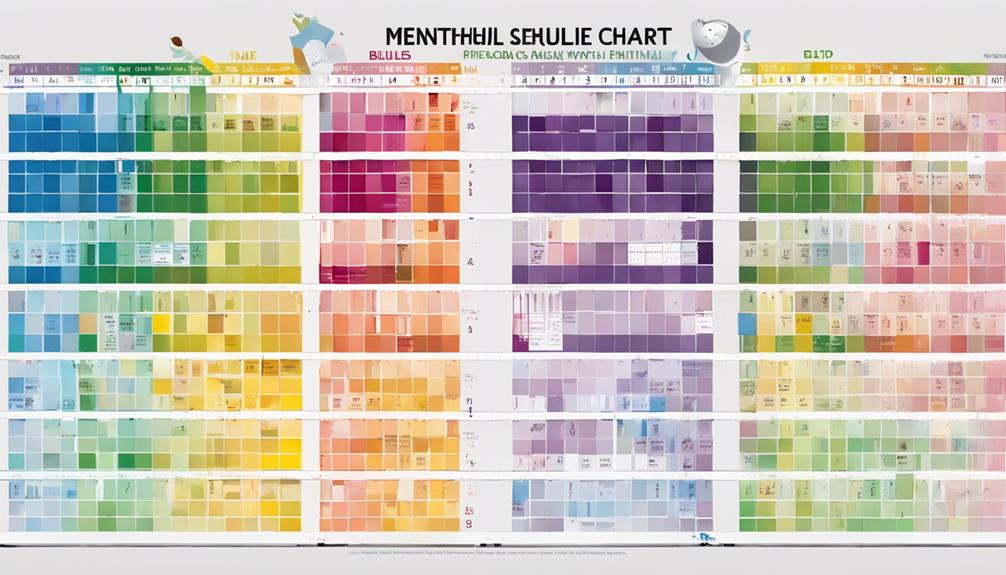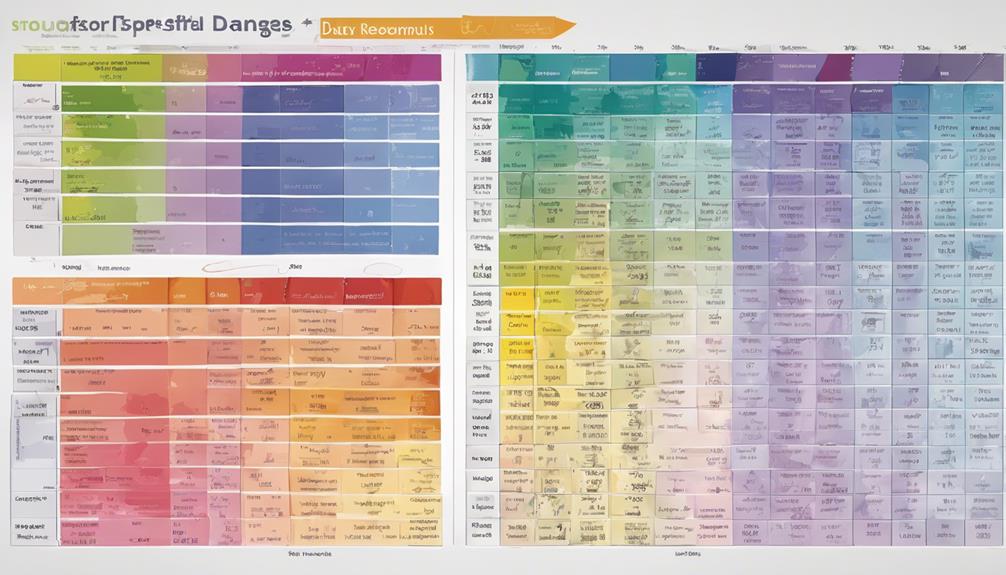When considering the benefits of formula feeding for your baby, it’s hard to ignore the numerous advantages it offers. From ensuring a well-rounded nutrient intake to providing flexibility in feeding schedules, formula feeding can truly make a positive impact for many parents.
But what are the other advantages that might surprise you? Let's explore how formula feeding can positively impact your baby's well-being and your daily routine.
Key Takeaways
- Formula feeding allows for shared feeding responsibilities and flexibility in schedules.
- Controlled intake and monitoring ensure precise measurement of nutrients for growth.
- Involvement of other caregivers promotes bonding, teamwork, and structured caregiving routines.
- Supports baby's growth with essential nutrients, consistent routine, and bonding opportunities.
Convenience for Busy Parents
In addition, formula feeding offers busy parents a convenient solution for sharing feeding responsibilities with partners or caregivers. This flexibility in feeding schedules is a game-changer for parents juggling multiple responsibilities. With formula feeding, partners and caregivers can easily take turns feeding the baby, allowing parents to manage their time more efficiently and evenly distribute the feeding duties. This shared responsibility can strengthen bonds between partners and caregivers, fostering a sense of teamwork in caring for the baby.
Moreover, formula feeding eliminates the need for dietary restrictions for the mother, offering convenience and ease. Parents can navigate their hectic schedules without worrying about specific dietary requirements, making formula feeding a stress-free option. Additionally, the lack of refrigeration needed for formula makes it ideal for on-the-go parents or when traveling, providing an added layer of convenience for busy families. Ultimately, formula feeding can be a practical and efficient choice for parents looking to balance their responsibilities while ensuring their baby is well-fed.
Controlled Intake and Monitoring

Shifting from contemplating the convenience of formula feeding for busy parents, controlled intake and monitoring play a crucial role in guaranteeing your baby's nutritional needs are met effectively. With formula feeding, you can precisely measure the amount of formula your baby consumes, providing visibility into the exact nutrients they are receiving. Monitoring your baby's intake becomes more manageable, allowing you to track feeding patterns and adjust as needed. This visibility aids in ensuring your baby's nutritional needs, making sure they are getting the required nourishment. Additionally, formula feeding enables caregivers to share feeding responsibilities, actively participating in monitoring the baby's intake. It also facilitates tracking the baby's growth and development through consistent and measurable feeding quantities. Below is a table summarizing the benefits of controlled intake and monitoring in formula feeding:
| Benefits | Details |
|---|---|
| Accurate Measurement | Measure the exact amount consumed |
| Monitoring Nutritional Needs | Track feeding patterns and adjust intake |
| Visibility into Nutrients | Guarantee the baby gets essential nutrients |
| Growth and Development | Track progress and adjust feeding accordingly |
Flexibility and Ease of Feeding
When considering the advantages of formula feeding for your baby, one can appreciate the flexibility and ease it offers in the feeding process. Formula feeding provides a convenient way to feed your baby, allowing for anyone to participate in feeding and bonding, including partners.
The structured feeding schedule of formula allows for a more predictable routine as formula takes longer to digest compared to breast milk. With formula feeding, there are no dietary restrictions for the mother, offering more freedom in food choices.
Additionally, formula feeding makes it convenient for various caregivers to feed the baby, whether it be family members or childcare providers. The ease of preparation and storage of formula also adds to the convenience, ensuring that feeding times can easily fit into different schedules.
Involvement of Other Caregivers

To involve other caregivers in feeding and bonding with the baby, formula feeding provides a practical solution that promotes shared responsibility and teamwork in caregiving. Partners, family members, and other caregivers can play an active role in caring for the baby by participating in feedings. This involvement fosters a sense of closeness and connection with the infant, benefiting both the caregivers and the baby. Here are some key ways formula feeding facilitates the involvement of other caregivers:
- Partners can take turns feeding the baby, allowing them to share the responsibility of caring for the infant and strengthening their bond with the child.
- Formula feeding offers flexibility and convenience, enabling anyone to feed the baby at any time, promoting a collaborative approach to caregiving among all involved.
- The predictable nature of formula feeding due to slower digestion allows for easier scheduling of feedings, creating a more structured routine that enhances the teamwork among caregivers.
Reduced Potential Breastfeeding Challenges
In exploring the benefits of formula feeding for your baby, it's important to note that formula feeding can greatly decrease the likelihood of encountering common breastfeeding challenges such as engorgement, sore nipples, and latching issues. By opting for formula, concerns about low milk supply are eliminated, allowing for consistent feeding that meets the baby's nutritional needs.
A predictable feeding schedule provided by formula feeding can be particularly helpful for busy parents managing multiple responsibilities. Additionally, formula feeding allows partners and other caregivers to easily participate in feeding sessions, fostering bonding and shared responsibilities in caring for the baby.
This shared involvement can strengthen the familial bond while ensuring that the baby's feeding needs are consistently met. For mothers returning to work or those facing difficulties with breastfeeding, formula feeding offers a practical solution that prioritizes the baby's nutrition and well-being.
Frequently Asked Questions
What Are the Benefits of Formula Feeding Babies?
Formula feeding offers flexibility for caregivers to share feeding responsibilities and allows partners to bond with the baby. It provides convenience with scheduling and dietary freedom for the mother. Formula feeding guarantees anyone can easily feed the baby.
Why Is Baby Formula Better?
Baby formula is a great option for many families. It offers flexibility, convenience, and allows both parents to bond with the baby. Plus, there are no dietary restrictions for the mother, making it a stress-free choice.
Is There a Downside to Formula Feeding?
Consider carefully the downsides of formula feeding, including potential higher costs, risks of allergies or digestive issues, reduced immune protection, contamination risks, and less emotional bonding compared to breastfeeding. Evaluate these factors thoughtfully.
Why Are Formula Fed Babies Happier?
We find that formula-fed babies may seem happier due to reduced feeding struggles. Caregivers can bond more easily with multiple feeders, leading to contentment. Formula feeding offers predictability, a structured routine, and a sense of security for a baby's happiness.
Conclusion
To sum up, formula feeding offers numerous benefits for both parents and babies. While some may argue that formula feeding lacks the emotional connection of breastfeeding, it's important to remember that bonding with your baby goes beyond feeding methods.
By considering the convenience, flexibility, and health benefits of formula feeding, parents can make informed choices that best suit their family's needs. Ultimately, what matters most is ensuring that your baby is well-nourished and thriving.









